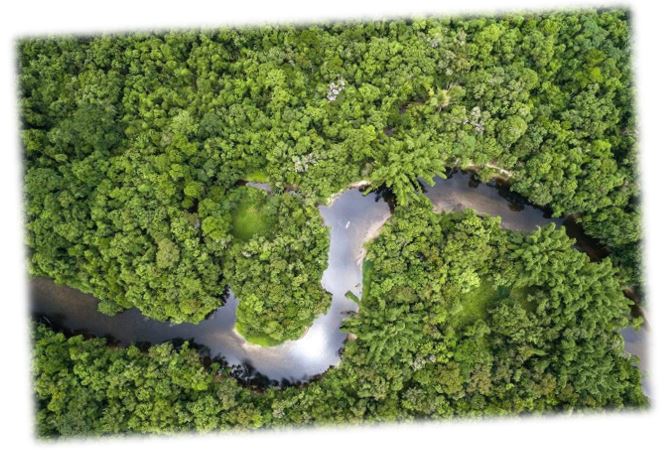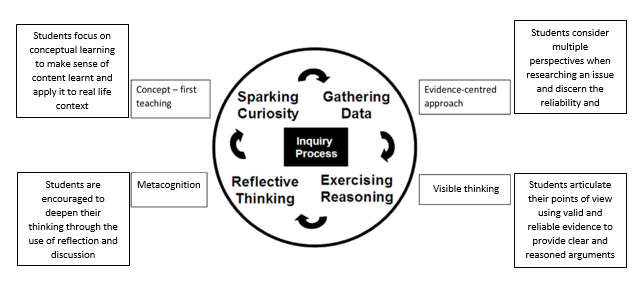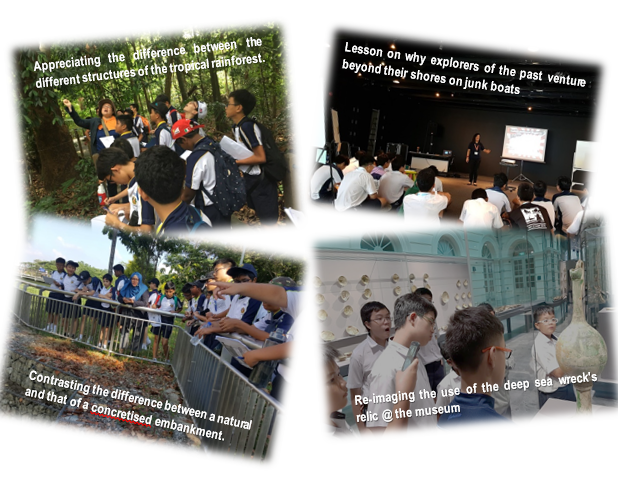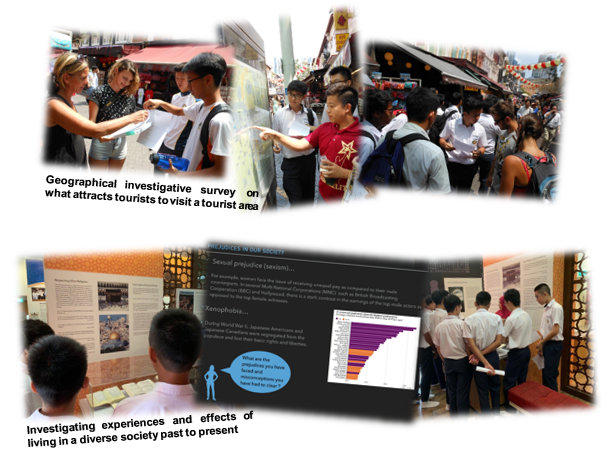Humanities
Humanities
The truth may be puzzling. It may take some work to grapple with. It may also be counterintuitive. It may contradict deeply held prejudices. It may not be consonant with what we desperately want to be true. But our preferences do not determine what’s true.” - Carl Sagan

Introduction
The aim of humanities education in St. Gabriel’s Secondary School is to encourage students to gain and develop a mastery of skills related to knowledge building and understanding of events and phenomenon, issues and perspectives, and human actions and behaviors.
Vision
Every Gabrielite is a skilled inquirer who is humbled by the world around him.
Mission
To be a team of effective humanities educators for diverse learners in
-
designing experiences that interest students
-
building and sustaining a learning community
-
making connections to students’ lives; and
-
aligning experiences to the outcomes which have been identified as important

Outer ring: The four descriptors reflect the type of learner that we would like to create through the Humanities curriculum. Ideally, a student of SGSS would after 4-5 years, become a well-informed citizen who is concerned about current issues within and outside of Singapore. He will also take initiative to participate in making the living environment a better place and will be future-ready to adapt to the trials of a VUCA world.
Inner quadrant and centre: These represent the connections which students will make through their learning of Humanities to make sense of the world we are living in. By acquiring sense-making skills, it will enable the students to continue to learn throughout their lives.
Key Teaching and Learning Pedagogies and Strategies

The Humanities Program
Lower Secondary
The Lower Secondary Humanities programme consists of two subjects- Geography and History. The concepts and content taught are Singapore-centred to provide students with a good grounding in skills and content which resonates with them because of the connection of the learning to their own lives.
In Geography, the students are not only poised to acquire a wide range of knowledge and skills to understand and explain physical and human phenomena that occur in different places and cultures. It also focuses on Singapore’s contemporary environmental and social issues. The subject also imbibes in students an awareness of appropriate attitudes and values that promotes a positive geographical future; one that ensures the sustainability of our resources, people, country, and planet.
For History, the students are exposed to Singapore’s formative years which allow them to view Singapore’s development and progress as a nation and its nation building efforts. This will help students to be more appreciative of what has been and understand the causal relationship between events and consequences. This will help them to reflect on how their own history has been shaped by the society around them and how they can make their own history as a global citizen.
To develop a passion in the humanities as well as to provide joy in learning, the Humanities curriculum provides students with the opportunities to make sense of their learning by making connections. For example, Learning Journeys is a key feature of the Sec 1 and 2 programme.

Upper Secondary
Humanities is a compulsory subject for all students at the upper secondary level. It comprises the subject Social Studies, with either Geography Elective or History Elective for both the Express and Normal Academic Students. Normal Technical students are exposed to the Social Studies citizenship module which is non-examinable.
The learning of Social Studies uses an inquiry-based learning approach which is seen as being key to transforming the teaching of the Humanities from a largely content-transmission approach to an approach that gets students to take ownership of their learning by purposefully seeking information and constructing their own knowledge within the norms and standards set by the disciplinary nature of the subjects. Many of the skills and concepts learnt will be issues related to authentic problems encountered in the world today. This is supported with the use of dynamic content (out of Textbook examples such as current affairs) to help students apply concepts learnt meaningfully and allow themselves to figure out constructive solutions in preparation to being contributing citizens in the world. We also hope that our students can possess critical thinking skills which will allow them to become discerning voices of conscience as a citizen.
The learning of Geography or History as an elective is meant to deepen the students’ passion in their chosen area of study after the exposure to both subjects at the Lower Secondary level. Geography will enable students to understand the physical and human interactions that occur in our environment and enable students to contextualize natural phenomena and human development while developing their consciousness of the world around them and how they can affect it more positively. History will allow students to visit the past occurrences and get to know personalities who shaped key events in the early 20th century and enable students to contextualize present government systems and political decisions while developing their consciousness of human behavior and reactions to present-day decision making and view world issues with a more balanced perspective and empathy.

|
The Humans in the Humanities Department
|
|---|
|
Ms Siti Rafeah Bte Rahmat (HOD/Humanities)
|
|
Ms Tanny Koh Tien Tien (SH/Geography)
|
Useful Websites
|
Social Studies |
History |
Geography |
|---|---|---|
Elements of Business Studies (EBS)
Teachers in Elements of Business Studies
1 . Mr. Rodney Goh (Coordinator)
2 . Ms. Farah Zeeba
Introduction
This syllabus is an introduction to business through an understanding of business activities, focusing on basic marketing and customer relations, in the context of Singapore. The syllabus intends to provide students with opportunities to develop transferable employability skills and knowledge in the service industry, namely the Travel and Tourism, Hospitality, and Retail industries, which continue to offer employment opportunities accessible to the students. It provides students with the foundational knowledge and skills for further studies in institutes of higher learning and the awareness of prospects of a career in the service industry.

Unit 1: Understanding business activities
This unit helps students to understand the purpose of a business and the various types of businesses in the Travel and Tourism, Hospitality, and Retail industries. Impact of competition and trends on the businesses, and careers in these industries, are also examined to develop an understanding of the challenges and opportunities presented.
Unit 2: Understanding basic marketing
This unit helps students to understand the basics of marketing and how businesses meet the needs and wants of customers. This includes the use of market survey to gather information about target customers, and the marketing process to reach out to them.
Unit 3: Understanding customer relations
This unit helps students to understand the need to provide quality service to customers and the importance of effective communication in building customer relations. Students will learn how to provide customer service in different interactions with customers.
Unit 4: Business investigation
This unit helps students to understand the process and skills needed to carry out an investigation for a business to improve its marketing mix so as to enhance its customers’ experience. Students will select, interpret, analyse and evaluate information and apply business knowledge to propose innovative and reasoned recommendation.
AIMS
The syllabus aims to provide students with the opportunity to develop foundational business knowledge, transferrable employability skills and values for their future areas of work. The Travel and Tourism, Hospitality, and Retail industries provide the context where application of these knowledge, skills and values can be demonstrated.
The syllabus outcomes are:
KNOWLEDGE AND UNDERSTANDING
The syllabus intends for students to develop knowledge and understanding of:
• basic business activities in the Travel and Tourism, Hospitality, and
Retail industries
• basic marketing that focuses on understanding the needs and wants of
customers and the marketing mix; and
• basic customer relations focusing on communicating with customers and
providing quality customer service.
SKILLS
The syllabus intends for students to develop the ability to:
• apply concepts in marketing and customer relations, including the use
of relevant terminology, to different contexts in the Travel and Tourism,
Hospitality, and Retail industries
• gather, select, interpret, analyse and evaluate information for the
investigation of a business
• think critically and innovatively to generate solutions and make decisions
to improve marketing and customer relations
• self-manage and direct personal learning to work independently and collaboratively
• communicate effectively; and
• harness the use of information and communication technologies (ICT)
where appropriate.
VALUES AND ATTITUDES
The syllabus intends for students to develop the values and attitudes of:
• integrity and responsibility in making decisions
• respect and social awareness in managing relationships with others
• an enterprising mindset
• resilience in overcoming challenges; and
• passion to pursue lifelong learning.

